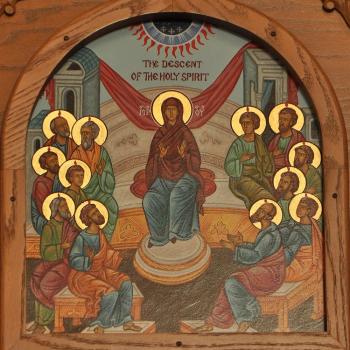 In the fifteenth century, the great theologian Cardinal Nicholas of Cusa dealt with many great ecclesiastical debates with grace and wisdom. He understood the way the Holy Spirit directed the church was not the same at every time and in every place; the Holy Spirit directed as needed, explaining how and why there were many changes in the way the church handled things throughout time. Trying to hold down and follow one way of being the church above all others obstructed the promptings of the Spirit to deal with the needs of the faithful. It is easy to look back into the past and absolutize it, but in doing so, the Spirit is lost, and so the grace which was offered in the past is also lost. In words written to the Bohemians, Nicholas of Cusa acknowledged that they were right in what they said about how rites used to be performed, but he also pointed out, they were not practices which were meant to be enforced and practiced at every time and place:
In the fifteenth century, the great theologian Cardinal Nicholas of Cusa dealt with many great ecclesiastical debates with grace and wisdom. He understood the way the Holy Spirit directed the church was not the same at every time and in every place; the Holy Spirit directed as needed, explaining how and why there were many changes in the way the church handled things throughout time. Trying to hold down and follow one way of being the church above all others obstructed the promptings of the Spirit to deal with the needs of the faithful. It is easy to look back into the past and absolutize it, but in doing so, the Spirit is lost, and so the grace which was offered in the past is also lost. In words written to the Bohemians, Nicholas of Cusa acknowledged that they were right in what they said about how rites used to be performed, but he also pointed out, they were not practices which were meant to be enforced and practiced at every time and place:
Perhaps you will say: today’s Church does not walk in the rite of communion as in former times, when most holy men affirmed by word and deed that the sacrament under both species, by the force of Christ’s precept, was necessary. Could the Church have been in error at that time? Certainly not! If not, how is what was then universally affirmed not true today, since this Church is the same as that one? Certainly it should not disturb you that the rite of sacrifices – and even of the sacraments – is found to be different at different times, while the truth stands fast. The Scriptures are both adapted to the times and understood in various ways, so that they are set forth at one time according to the current universal rite, but when that rite changes, opinions about it change again. Christ, to whom the Father handed over the celestial and terrestrial kingdoms, ruling by means of a wonderous order of angels and men, dispenses mysteries according to the changing of times; and He supplies what fits particular times by hidden inspiration or evident demonstration.[1]
Nicholas explained that this was not true merely for liturgical rites; the sacrament of marriage itself had undergone change throughout the centuries:
The same is proved by the sacrament of matrimony. Did not God declare from the beginning to join together those who, agreeing with intent and mutual consent, contract matrimony, and is it not commanded that man should not separate what God has joined? And it is obvious, since it was instituted in Paradise, that the sacrament did not make any exceptions regarding degrees of consanguinity. Nevertheless, with the passing of time, as occasion rose, the Church ruled marriage within certain grades unreasonable; and it deed that, if anyone married within those grades, they were to be separated afterwards, notwithstanding that previously they were not separated, as though joined by God. [2]
Consanguinity, close blood relationships, became a means by which a marriage could be absolved, and in the process, allowed for second marriages. Nicholas, with great insight, explained centuries before the present, how the church could and did change the sacrament of marriage, and with it, who could and could not get remarried.[3]
Because of the work of the Holy Spirit in guiding the church, Nicholas pointed out it was important for everyone to heed the direction the church was heading. Those who contended with objections, finding legalistic excuses to dismiss the pastoral mission of the church, pit the church against Christ; to say we must listen to Christ above the church is to disassociate the two, causing Christ to fight against his own body; it is presumption, Nicholas explained, which caused this divide:
When, however, presumptuous rashness prefers some rite or other to unity and peace, even if that rite should be good, holy and praiseworthy in itself, it is damnable. You say: we must obey Christ’s command first of all, then that of the Church. If the Church commands other than Christ does, we must obey not the Church but Christ.
Certainly in this lies the beginning of all presumption: when individuals judge their own understanding of divine commands to be more conformed to the divine will than that of the universal Church. [4]
This is the problem which Pope Francis has to deal with by many of his so-called Catholic critics who presume they can pit him against Christ. They say we are to obey Christ, which is true, but they ignore the relationship between obeying Christ and obeying the prompting of the Spirit in the church today; they are one and the same and are not to be separated. “He who hears you hears me, and he who rejects you rejects me, and he who rejects me rejects him who sent me” (Lk. 10:16 RSV).
Pope Francis’ appeal to mercy and grace, loosening as he wills through the mercy and grace of the Spirit, has led many to contradict themselves by asserting tradition while denouncing what that tradition teaches of the church and her authority. The church is a sacrament, a vessel of mercy, bringing people across the rough winds of the sea of sin to their heavenly destination; forgetting this turns the church away from its merciful mission and into an object of scorn as it hunkers down on one spot in the ocean, afraid of the rough waters ahead. Pope Francis, with great understanding, rightfully called out what is wrong with his critics. Like Nicholas of Cusa before him, he explained in Gaudete et exsultate that it is a rejection of the work of the Holy Spirit in the church today, guiding and directing the people today by trying to hold on to the dead letter of the past:
Not infrequently, contrary to the promptings of the Spirit, the life of the Church can become a museum piece or the possession of a select few. This can occur when some groups of Christians give excessive importance to certain rules, customs or ways of acting. The Gospel then tends to be reduced and constricted, deprived of its simplicity, allure and savour. This may well be a subtle form of pelagianism, for it appears to subject the life of grace to certain human structures. It can affect groups, movements and communities, and it explains why so often they begin with an intense life in the Spirit, only to end up fossilized… or corrupt.[5]
Nicholas of Cusa, after all, explained to the Bohemians similarly:
Hence, even if today there is an interpretation by the Church of the same Gospel command differing from that of former times, nevertheless, the understanding now currently in use for the rule of the Church was inspired as befitting the times and should be accepted as the way of salvation.[6]
Likewise, we must realizes changes we seen in the church today are not against the will of Christ, for it is Christ, Nicholas explained, who wills such changes:
And this change is not like depending on the lesser authority of Christ as teacher, since the Church, which is the body of Christ and is quickened by His Spirit, does nothing other than what Christ wishes. And so the change of interpretation depends upon the will of Christ, who now wills it so by His inspiration, just as once this very proper precept was practiced otherwise, according to the need of the time. And, therefore, this power to bind and loose is no less in the Church than in Christ. [7]
The church promotes mercy and grace. While it is a human institution, often slow in change, nonetheless, the Holy Spirit works with it, guiding and directing it, making for changes as needed. The church, like the Sabbath, is made for the people, not the people for the church. When grace is being subverted, the Holy Spirit will act, so that the people once again can be reached by the grace of Christ. This has always been the case, which is why the arguments of those who resist the prompting of the Spirit always remains the same: legalistic and without grace or mercy. After all, did not the church have to deal with similar contentions when the Novatians forbade mercy to the lapsed with the Novatian saying that the church was changing its ways by granting forgiveness and communion to the fallen? Did not the church have to deal with similar contentions with the Jansenists, whose legalism caused many people to be over-scrupulous, forgetting the mercy which Christ has given to all? As St. Cyprian explained, our church should follow and imitate Christ, who would not kick people away because of their spiritual wounds:
Considering His love and mercy, we ought not to be so bitter, nor cruel, nor inhuman in cherishing the brethren, but to mourn with those that mourn, and to weep with them that weep, and to raise them up as much as we can by the help and comfort of our love; neither being too ungentle and pertinacious in repelling their repentance; nor, again, being too lax and easy in rashly yielding communion. Lo! A wounded brother lies stricken by the enemy in the field of battle. There the devil is striving to slay him whom he has wounded; here Christ is exhorting that he whom He has redeemed may not wholly perish. Whether of the two do we assist? On whose side do we stand? Whether do we favour the devil, that he may destroy, and pass by our prostrate lifeless brother, as in the Gospel did the priest and Levite; or rather, as priests of God and Christ, do we imitate what Christ both taught and did, and snatch the wounded man from the jaws of the enemy, that we may preserve him cured for God the judge?[8]
Do we let the devil destroy the fallen in our cruel determination to hold on to the letter that kills or will we embrace gracious mercy of Christ which truly lifts up the sinner and welcomes them back with love? Pope Francis tells us Christ’s answer. Will we listen?
[Image=Pope Francis by Benhur Arcayan (Malacañang Photo Bureau) [Public domain], via Wikimedia Commons]
[1] Nicholas of Cusa, “To the Bohemians” in Nicholas of Cusa: Writings on Church and Reform. Trans. Thomas M. Izbicki (Cambridge: Harvard University Press, 2008), 21.
[2] Nicholas of Cusa, “To the Bohemians,”31.
[3] With is close contact with the Orthodox, he would have also known the practices of the Greeks, which differed from the Western practice, and that would have given him even greater insight on the matter, albeit, it was not his purpose here to discuss the history of the sacrament of matrimony.
[4] Nicholas of Cusa, “To the Bohemians” in Nicholas of Cusa: Writings on Church and Reform. Trans. Thomas M. Izbicki (Cambridge: Harvard University Press, 2008), 17.
[5] Pope Francis, Gaudete et exsultate. Vatican Translation. ¶58.
[6] Nicholas of Cusa, “To the Bohemians,” 23.
[7] Nicholas of Cusa, “To the Bohemians” in Nicholas of Cusa: Writings on Church and Reform. Trans. Thomas M. Izbicki (Cambridge: Harvard University Press, 2008), 29.
[8] St. Cyprian, ‘Epistle LI” in ANF(5):332.
Stay in touch! Like A Little Bit of Nothing on Facebook













